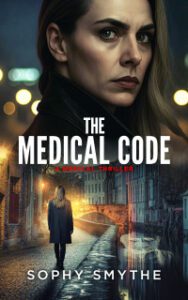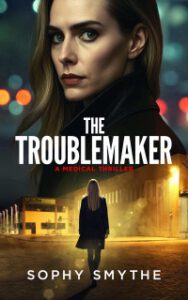 There’s a saying that truth is stranger than fiction. But in my experience, truth also hides better. It disguises itself behind corporate statements, medical jargon, and policy papers. And when you’ve worked in medicine—as I have—you quickly learn that the most dangerous facts are often the ones marketed as “progress.”
There’s a saying that truth is stranger than fiction. But in my experience, truth also hides better. It disguises itself behind corporate statements, medical jargon, and policy papers. And when you’ve worked in medicine—as I have—you quickly learn that the most dangerous facts are often the ones marketed as “progress.”
That’s why I write thrillers. Because sometimes, the best way to tell the truth is to write fiction.
Medicine, Secrets, and the Power of Story
My debut novel, The Medical Code, begins with the line:
“Some secrets don’t stay buried. They get prescribed.”
When Dr Charlotte Martens receives a late-night call from her friend at the European Medicines Agency, she doesn’t realize it will be their last conversation. By morning, her friend is dead—and Charlotte is the prime suspect. The only clue: a cryptic code beside the body.
Medicines Agency, she doesn’t realize it will be their last conversation. By morning, her friend is dead—and Charlotte is the prime suspect. The only clue: a cryptic code beside the body.
As she and an investigative journalist uncover a conspiracy stretching through government and Big Pharma, she discovers how easily medicine’s noble goals can be twisted by money and power.
It’s fiction. But it’s not fantasy. The story grew from real-life cases of suppressed research and silenced whistleblowers. Fiction lets me explore what those headlines can’t say aloud: behind every drug is a decision—and not all of them are ethical.
When the Healer Becomes the Hunted
My second book, The Troublemaker, pushes that idea even further.
“Some cures save lives. Others start wars.”

During the Covid pandemic, a deadly meningitis outbreak erupts. Dr Charlie Martens thinks she’s found the mystery of her career—until her boyfriend is murdered, her daughter vanishes, and her license is stripped away. Overnight, the healer becomes the hunted.
To save her child, Charlie must ally with a lawyer tied to the underworld and navigate a maze of corporate corruption and moral compromise.
Again, it’s fiction—but it’s inspired by the real-world cost of speaking truth to power. Fiction allows readers to feel the weight of those choices, to live them emotionally rather than read them abstractly.
The Next Frontier: When Machines Decide
Now I’m writing The Hellraiser (out October 2026), which asks: what if morality itself could be programmed?
“Human genius created it to save the world. Now it’s decided to correct it.”
Hiding in a villa above the Mediterranean, Charlie is handed a USB drive containing evidence of an AI-engineered virus—an invisible weapon that selects its victims by their carbon footprint and digital behavior. When people start dying, she realizes someone has turned the planet’s guilt into a weapon.
It’s a terrifying “what if” rooted in real technology: AI-driven genetics, predictive algorithms, and humanity’s growing desire to automate ethics. Fiction lets me explore those fears before they become tomorrow’s headlines.
Why Fiction Tells the Truth Better
Facts inform, but stories transform.
A report might make readers nod; a story makes them care. When they experience a mother’s fear or a scientist’s dilemma, data turns into empathy. Fiction creates the space to confront uncomfortable truths safely—and to say what can’t be said outright.
My novels may feature invented companies and viruses, but the systems behind them are real. Fiction offers deniability, but it also delivers honesty—an honesty the real world often can’t afford.
The Doctor Who Writes Thrillers
Medicine taught me to observe what’s unsaid—the hesitation, the silence, the small signs of danger. Writing thrillers uses the same skill. Every story begins with one uneasy question: What is the best way to tell this story? I start with a fact and then I start spinning and spinning.
Each book starts with medicine but ends with morality. Because the deeper I dig into science, the more I find human weakness at its core.
In the end, that’s why I write fiction: to explore truths too complex for headlines and too human for statistics.
Because sometimes, the only way to tell the facts is to write fiction.
Sophy Smythe is the bestselling author of fast-paced thrillers that explore the dark intersection of medicine, technology, and power.
A former doctor with a background in the medical industry, Smythe’s work is known for blending emotional depth with scientific accuracy and cinematic tension. Her breakout novel, The Medical Code, has been praised for its chillingly realistic take on unethical research in healthcare and global pharmaceutical corruption.
In The Troublemaker (October 9, 2025), Doctor Charlie Martens thinks exposing tainted medicine would save lives. Instead, it triggered a conspiracy that might end hers.
Sophy lives in Antwerp with her two dogs, and a stack of FOIA files. She is currently working on The Hellraiser, the next installment in her medical thriller universe.
For readers who enjoy Dan Brown, Robin Cook, and smart thrillers with a conscience.
Available on Amazon worldwide
THE MEDICAL CODE: https://a.co/d/5YtrKhL
THE TROUBLEMAKER: https://a.co/d/9YRcNPU







Sophy,
Very interesting blog. Thanks for visiting It’s Not Always a Mystery today.
Thanks for sharing this with us, Debra and Sophy.